Introduction
With the rise of AI-driven automation, cloud-based HR solutions, and data analytics, HRMS software is becoming more sophisticated. By 2025, companies will rely even more on AI-powered HR tools to optimize workforce management and improve employee experiences.
As HR operations evolve, platforms like hrtech offer comprehensive solutions that adapt to these advancements, providing a wide range of HRMS options tailored for diverse business needs.
This guide explores the best HRMS software solutions for 2025, their key features, top vendors, selection criteria, and future trends. Whether you’re a startup, a small business, or a large enterprise, choosing the right HRMS will help streamline your HR operations, boost productivity, and ensure compliance.
Why Businesses Need HRMS Software in 2025?
With remote work and digital transformation shaping the future of HR, investing in an advanced HRMS solution is no longer a luxury—it’s a necessity. Businesses that implement HRMS gain:
- Scalability – Easily adapt HR processes as the workforce grows
- Cost savings – Reduces HR overhead and administrative workload
- Data-driven decision making – Helps HR teams align HR strategies with business goals
- Better employee engagement – Enhances transparency and self-service functionalities
Understanding HRMS Software Solutions
As companies shift toward data-driven decision-making and AI-powered automation, HRMS solutions have become more intelligent, scalable, and customizable. This section explores how HRMS software streamlines HR operations, the importance of data analytics, and the key functions that make it an indispensable tool for modern businesses.
1. Role in streamlining HR processes
Human Resource Management System (HRMS) software serves as an all-in-one digital solution for handling critical HR functions. Traditionally, HR departments managed employee records, payroll, recruitment, and compliance manually, leading to inefficiencies, errors, and compliance risks. HRMS software automates these processes, eliminating redundancy and reducing administrative burden.
A well-implemented HRMS:
- Improves efficiency – Automates payroll, attendance tracking, and compliance reporting
- Enhances accuracy – Reduces manual data entry errors and ensures precise record-keeping
- Saves time – Allows HR teams to focus on strategic initiatives rather than routine administrative tasks
- Boosts employee satisfaction – Provides self-service options for leave requests, benefits enrollment, and performance tracking
With features like AI-powered automation, cloud integration, and real-time analytics, HRMS solutions are transforming HR departments into data-driven, strategic business units.
2. Importance of data analytics in HRMS
One of the biggest advantages of modern HRMS software is its ability to leverage data analytics for better decision-making. HRMS platforms collect, analyze, and visualize workforce data, enabling HR teams to gain actionable insights into employee performance, hiring trends, and retention rates.
Some key benefits of HRMS data analytics include:
- Predictive analytics for talent management – AI-powered HRMS tools analyze past hiring trends to predict which candidates are more likely to succeed in specific roles.
- Employee turnover analysis – Identifies factors leading to high turnover rates and suggests strategies for improving retention.
- Workforce productivity tracking – Tracks employee performance metrics and suggests areas for improvement.
- Compensation and benefits optimization – Compares salary structures against industry standards to ensure competitive pay.
By harnessing the power of data analytics, businesses can make more informed HR decisions, optimize workforce planning, and proactively address employee concerns before they escalate.
3. Overview of critical HR functions
A robust HRMS system provides a comprehensive suite of HR functions, ensuring businesses can efficiently manage every aspect of workforce administration. The key HR functions supported by HRMS software include:
a) Employee data management
HRMS solutions serve as a centralized database for securely storing and managing employee records, contact details, tax forms, performance reports, and compensation history. Cloud-based HRMS systems ensure secure data access, allowing HR personnel to retrieve information in real-time.
b) Payroll and benefits administration
Payroll processing is a complex HR function that involves salary calculations, tax deductions, and benefits management. An HRMS automates:
- Salary computation – Eliminates manual errors in payroll calculations
- Tax compliance – Ensures automatic tax deductions and compliance with local regulations
- Direct deposit processing – Seamlessly integrates with banking systems for timely salary disbursement
- Benefits enrollment – Employees can select and manage benefits plans through self-service portals
c) Time and attendance tracking
HRMS software integrates with:
- Biometric systems (fingerprint scanners, facial recognition)
- GPS-based tracking for remote employees
- Automated shift scheduling to manage work hours
This ensures accurate tracking of work hours, overtime, and absenteeism, helping businesses avoid payroll discrepancies and comply with labor laws.
d) Recruitment and onboarding
HRMS solutions streamline recruitment by automating:
- Job postings and applicant tracking
- Resume parsing and candidate shortlisting
- Interview scheduling and offer letter generation
Once a candidate is hired, HRMS facilitates onboarding workflows, ensuring new employees can quickly access company policies, training materials, and documentation.
e) Performance management
A strong HRMS system helps businesses:
- Set employee goals and track performance
- Conduct 360-degree performance reviews
- Monitor key performance indicators (KPIs)
- Provide real-time feedback for continuous improvement
With AI-driven insights, HR teams can identify top-performing employees, skill gaps, and training needs, ensuring a well-developed workforce.
f) Compliance and legal regulations
HRMS solutions ensure that businesses stay compliant with:
- Labor laws and employment regulations
- Health and safety policies
- Diversity and equal opportunity requirements
Automated compliance reporting minimizes legal risks and helps companies avoid hefty fines and penalties.
g) Employee self-service portals
One of the most significant advantages of HRMS software is its employee self-service functionality. Instead of relying on HR teams for every request, employees can:
- View and update their personal information
- Apply for leave and track approvals
- Check payroll details and download tax forms
- Access company policies and HR announcements
This enhances the overall employee experience, making HR processes more transparent and efficient.
With resources like hrtech‘s marketplace, finding intelligent and customizable HRMS solutions has never been easier.
Before moving on to the world of popular HRMS vendors, let’s dive a bit deeper into the undeniable advantages they bring.
Advantages of Implementing HRMS
Implementing an HRMS streamlines workforce management, enhances compliance, and boosts overall efficiency. Here’s how it benefits organizations:
1. Automation of HR processes – HRMS eliminates manual tasks by automating payroll, attendance tracking, recruitment, and performance management, saving time and reducing errors.
2. Centralized data management – It stores all employee information in one place, ensuring data accuracy, real-time updates, and secure access, making HR operations more efficient.
3. Cost savings & efficiency – HRMS reduces administrative costs, paperwork, and compliance risks, while boosting productivity through self-service portals and workflow automation.
4. Compliance & regulatory support – It ensures adherence to labor laws, tax regulations, and audit requirements, minimizing legal risks with automated compliance tracking.
5. Improved employee experience – Self-service portals empower employees to manage leave, payroll, and training independently, improving satisfaction and engagement.
6. Data-driven decision making – HRMS provides real-time analytics on workforce trends, performance, and retention, helping HR leaders make smarter decisions.
7. Scalability for business growth – Designed to grow with businesses, HRMS supports multi-location teams, global payroll, and third-party integrations, ensuring long-term adaptability.
And just like that, we venture into analyzing today’s top HRMS vendors and their offerings, ready to modernize your HR operations.
Popular HRMS Vendors for 2025
With a growing demand for efficient HR management solutions, the market is flooded with various HRMS vendors offering feature-rich, AI-powered, and cloud-based platforms. Choosing the right HRMS provider can be overwhelming, as businesses must consider functionality, scalability, pricing, and integration capabilities.
Below, we explore some of the top HRMS vendors for 2025, including their standout features, strengths, and why they are preferred by businesses worldwide.
1. TeamLease Digital – The Ultimate HR Technology Marketplace
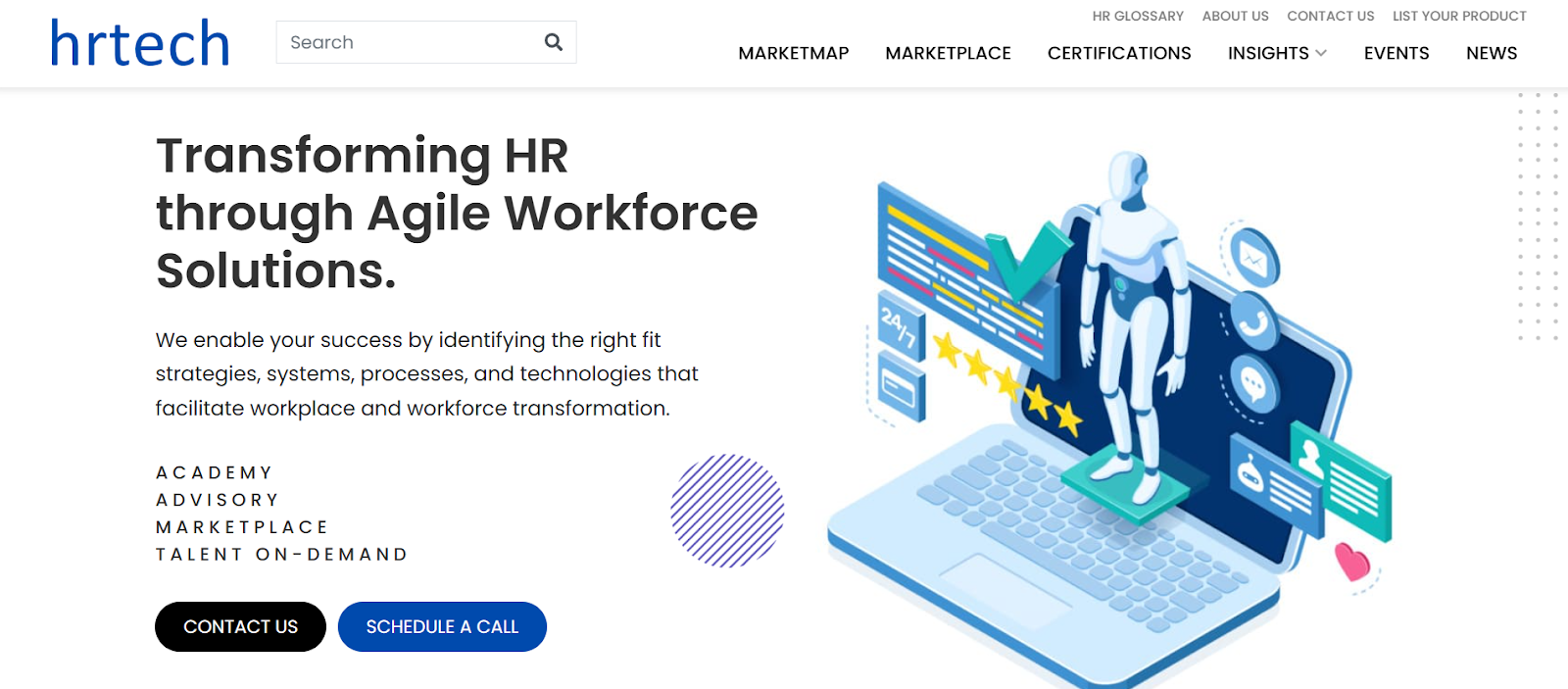
Best for: HR professionals and teams in UAE and Saudi Arabia looking for a one-stop HR technology marketplace.
Overview:
TeamLease Digital is the largest HR technology marketplace in Asia & the Middle East, serving as a comprehensive platform for HR professionals to find the best HR solutions. Unlike traditional HRMS providers, it doesn’t just offer a single HRMS solution—it provides a marketplace where businesses can explore, compare, and select HR technology solutions tailored to their specific needs.
Key Features & Strengths:
✔ All-in-One HR Technology Platform: Consolidates multiple HR software solutions in one place.
✔ Fast Performance & Optimized Loading Speeds: Unlike other marketplaces that suffer from slow website loading times, it prioritizes speed and efficiency.
✔ Curated HR Content & Insights: Offers valuable industry insights, research, and expert reviews to help businesses make informed decisions.
✔ Global Reach & Specialization: Focuses on HR professionals in UAE, Saudi Arabia, and other Middle Eastern markets, making it a go-to resource for regional HR teams.
Why choose TeamLease Digital?
TeamLease Digital is ideal for businesses seeking a marketplace-like experience, where they can compare various HRMS vendors, read expert reviews, and find the most cost-effective and feature-rich solutions for their needs.
Discover Your Ideal HR Solution Today with TLD
Are you ready to revolutionize your HR processes? TLD offers you the ultimate marketplace to explore, compare, and select the best HR technologies that fit your needs.
Start optimizing your HR strategies today and take the first step towards finding the perfect HR technology solution!
Explore Hrtech Now and Elevate Your HR Operations!
2. Zoho People
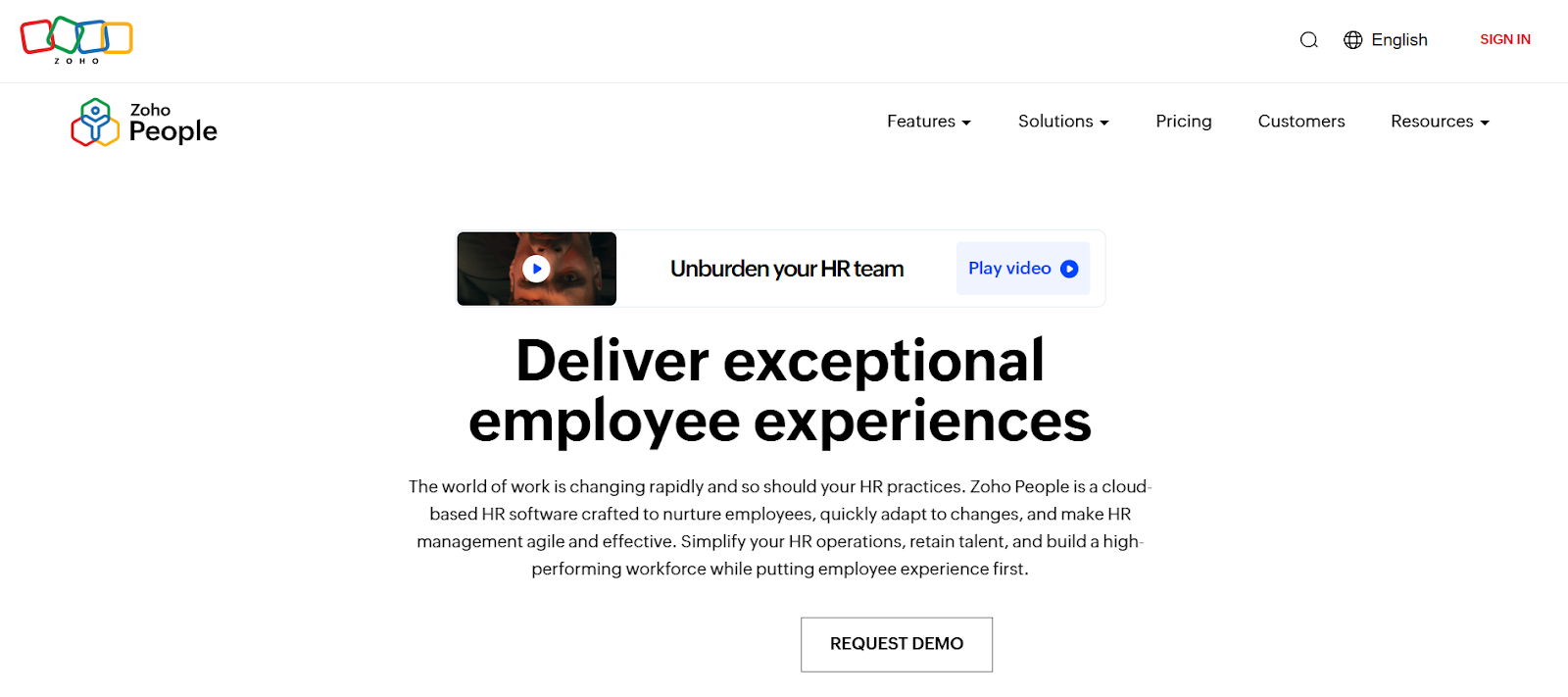
Best for: Small to medium-sized businesses (SMBs) needing an affordable, cloud-based HRMS with customization options.
Overview:
Zoho People is a highly customizable cloud-based HRMS that simplifies workforce management for businesses of all sizes. It offers end-to-end HR functionalities, including payroll, leave tracking, and performance management.
Key Features & Strengths:
✔ Customizable Workflows – Tailor HR processes to meet company needs.
✔ AI-Powered Automation – Reduces manual tasks in HR administration.
✔ Self-Service Portals – Allows employees to update personal data, apply for leave, and access payslips.
✔ Affordable Pricing – Cost-effective solution for small and mid-sized businesses.
3. Enfinity HRMS
Best for: MENA-based enterprises seeking a fully compliant, cloud-native HRMS with deep localization and mobile-first functionality.
Overview:
Enfinity HRMS is a robust, cloud-based human resource management solution tailored for businesses operating in the MENA region. Designed with local labour laws in mind, it offers end-to-end HR automation, from hire to retire, while ensuring compliance, scalability, and user convenience.
With intuitive dashboards, multi-language support, and advanced analytics, Enfinity streamlines HR operations for both HR teams and employees.
Key Features & Strengths:
✔ MENA Labour Law Compliance – Built-in alignment with GCC labour regulations and payroll rules.
✔ Mobile-First Design – Full-featured HRMS experience via iOS and Android apps.
✔ Modular & Scalable – Covers core HR, payroll, recruitment, performance, and time management.
✔ ESS/MSS Portals – Enables employees and managers to handle requests and pending approvals independently using a self-service platform.
✔ Integration-Ready – Compatible with third-party applications for accounting, ERP, and more.
✔ Arabic Interface – Native language support for broader regional accessibility.
Affordable Subscription Plans – Budget-friendly for all types of businesses.
4. Workday
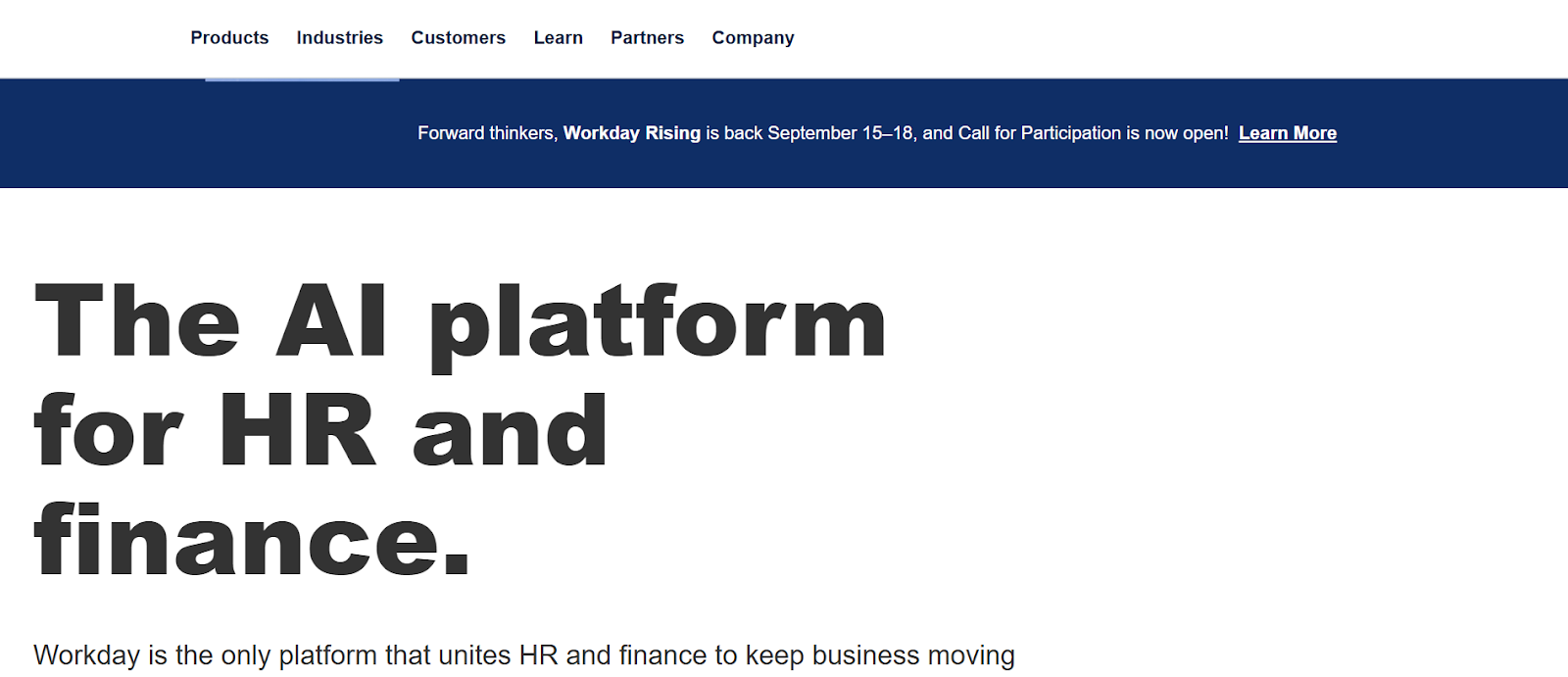
Best for: Large enterprises seeking an AI-powered, cloud-based HRMS with global workforce management capabilities.
Overview:
Workday is one of the most powerful HRMS solutions for enterprises, offering a full suite of AI-driven HR automation, payroll management, and workforce analytics tools. It’s widely used by Fortune 500 companies due to its scalability and robust compliance features.
Key Features & Strengths:
✔ AI and Machine Learning for HR Insights – Helps businesses predict workforce trends.
✔ Comprehensive Workforce Planning & Analytics – Provides deep insights into employee productivity and engagement.
✔ Global Payroll & Benefits Management – Ensures compliance with international payroll regulations.
✔ Highly Secure Cloud-Based Platform – Trusted by large corporations for data security and compliance.
5. BambooHR
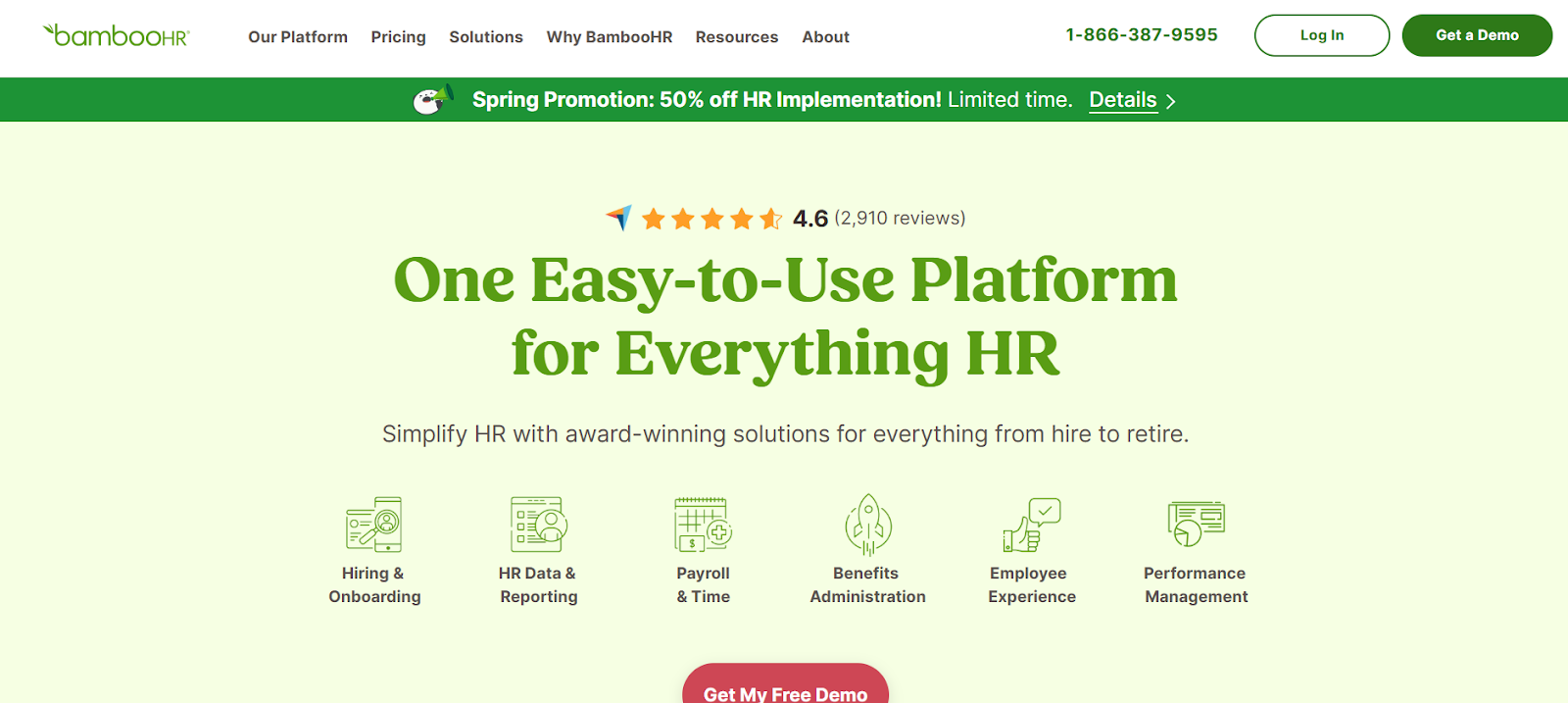
Best for: Small businesses needing an easy-to-use HRMS with core HR features.
Overview:
BambooHR is a user-friendly HRMS platform designed specifically for small and medium businesses. It focuses on core HR functions such as employee records management, payroll processing, and performance tracking.
Key Features & Strengths:
✔ Intuitive & Simple Interface – Easy for HR teams and employees to navigate.
✔ Automated Onboarding & Performance Reviews – Ensures smooth employee integration and tracking.
✔ Customizable HR Reports & Analytics – Provides insights into workforce productivity.
✔ Affordable Subscription Plans – Budget-friendly for small businesses.
6. Paycor
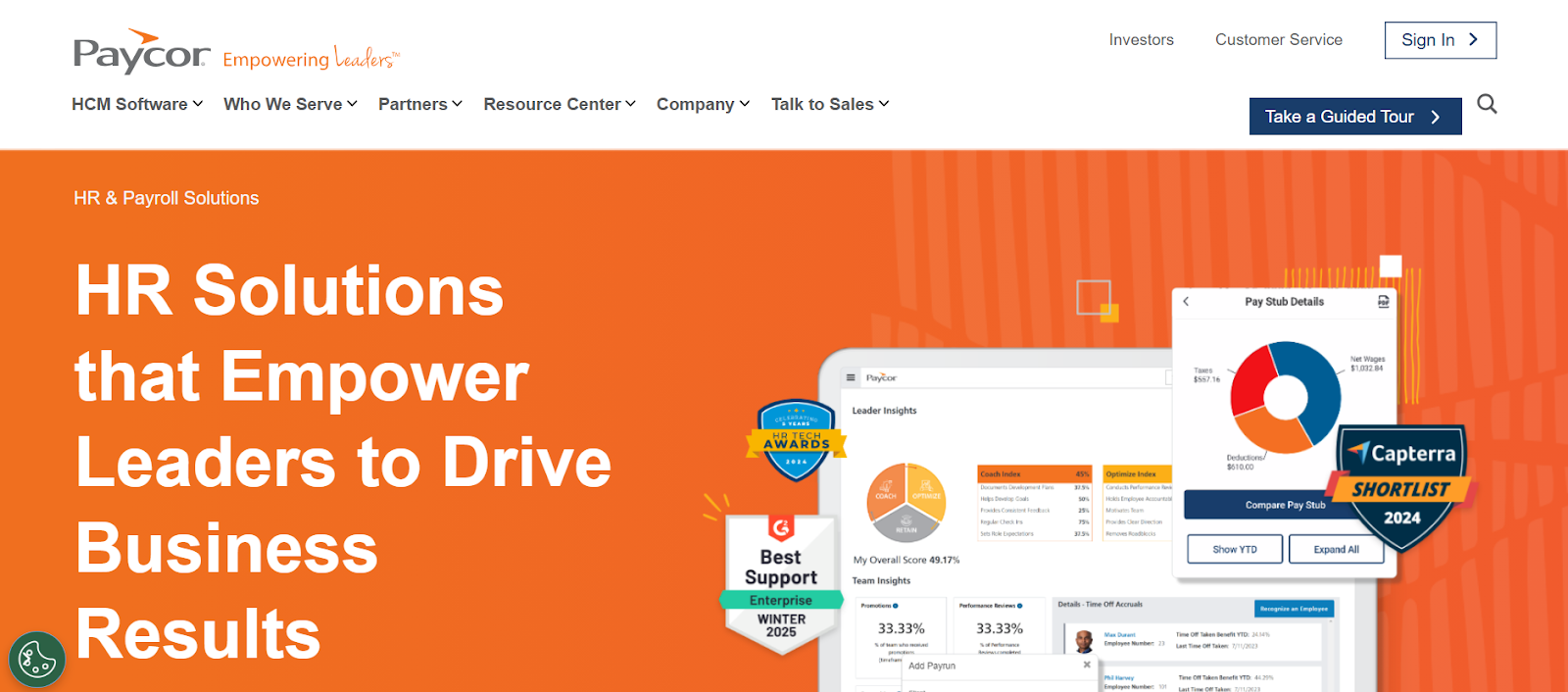
Best for: Businesses needing a mobile-friendly HRMS with payroll, recruitment, and performance management capabilities.
Overview:
Paycor offers a full-scale HRMS solution with mobile accessibility, making it an excellent choice for businesses that require on-the-go HR management. Its AI-driven analytics help HR teams optimize hiring, payroll processing, and employee engagement strategies.
Key Features & Strengths:
✔ Mobile-Optimized HRMS – HR teams can manage payroll, approvals, and employee data via mobile.
✔ AI-Powered Recruiting & Onboarding – Streamlines hiring processes.
✔ Payroll & Tax Compliance – Ensures smooth payroll processing with built-in compliance features.
✔ Employee Engagement Tools – Helps track employee performance and satisfaction levels.
7. ADP Workforce Now
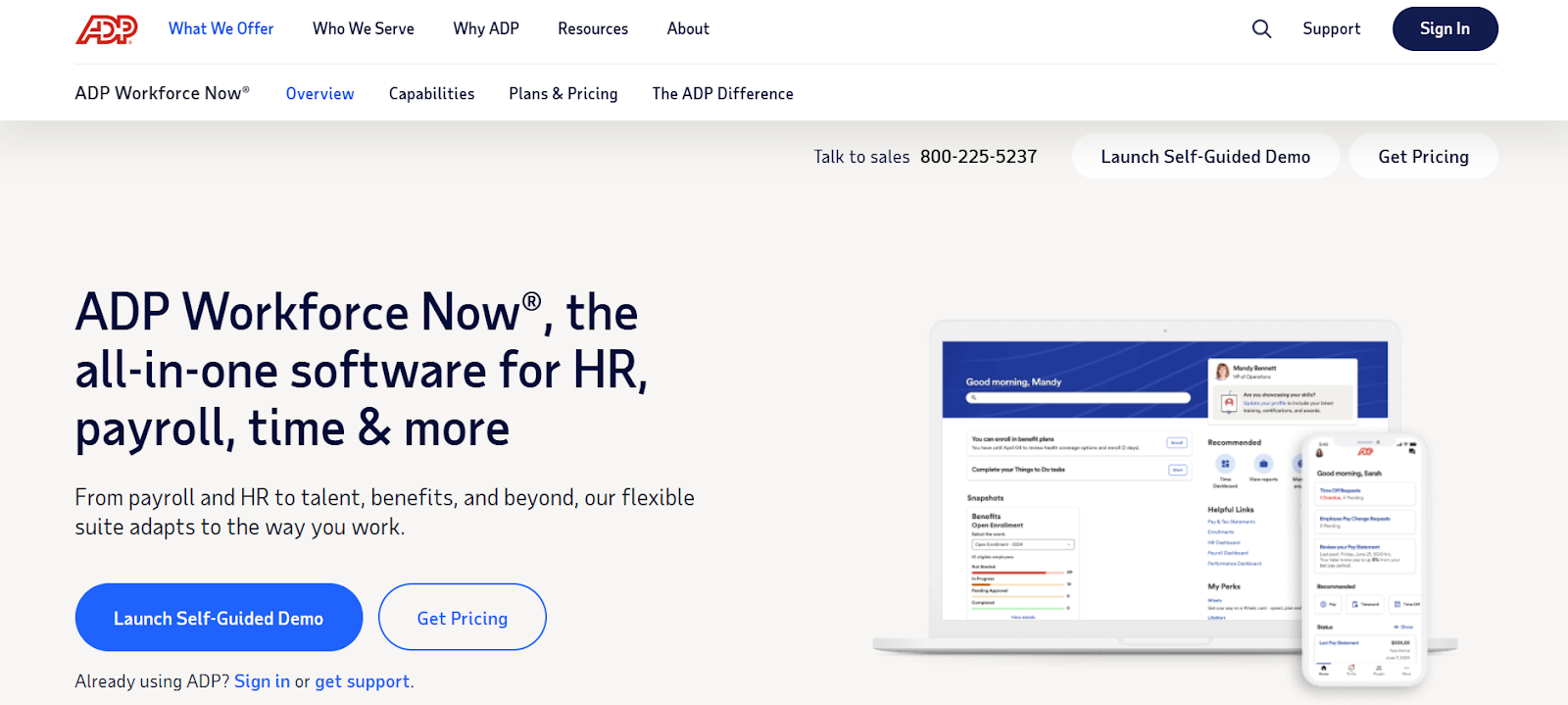
Best for: Large enterprises looking for a highly secure, cloud-based HRMS.
Overview:
ADP Workforce Now is a powerful, enterprise-level HRMS specializing in payroll processing, tax compliance, and benefits administration.
Key Features & Strengths:
✔ Comprehensive Payroll & Tax Compliance – Ensures smooth payroll management.
✔ AI-Driven Workforce Analytics – Provides deep insights into workforce trends.
8. Gusto – Best for Small Businesses & Startups
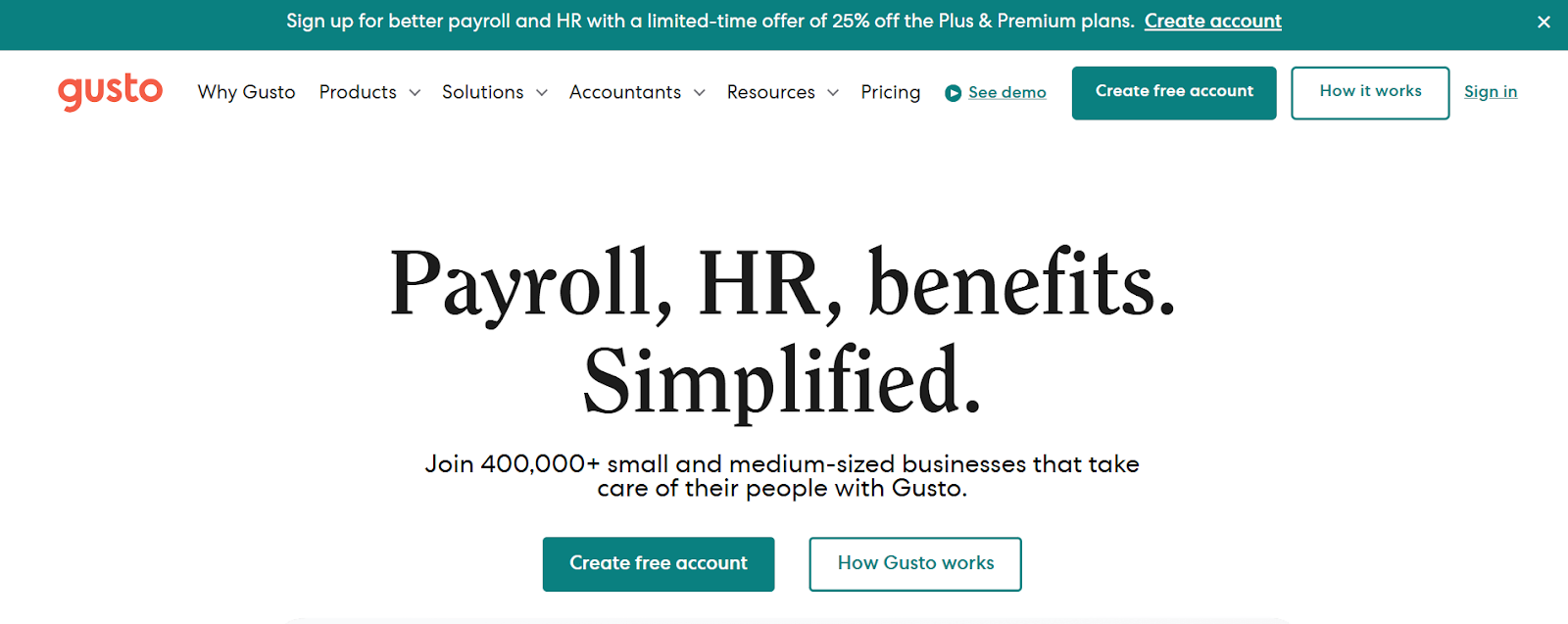
Best for: Start-ups and small businesses needing a simple, cost-effective HRMS.
Overview:
Gusto is an easy-to-use, cloud-based HRMS tailored for startups and small businesses.
Key Features & Strengths:
✔ Simple Payroll Processing – Automates tax filings and payments.
✔ Affordable Pricing – Budget-friendly HRMS solution.
9. Darwinbox
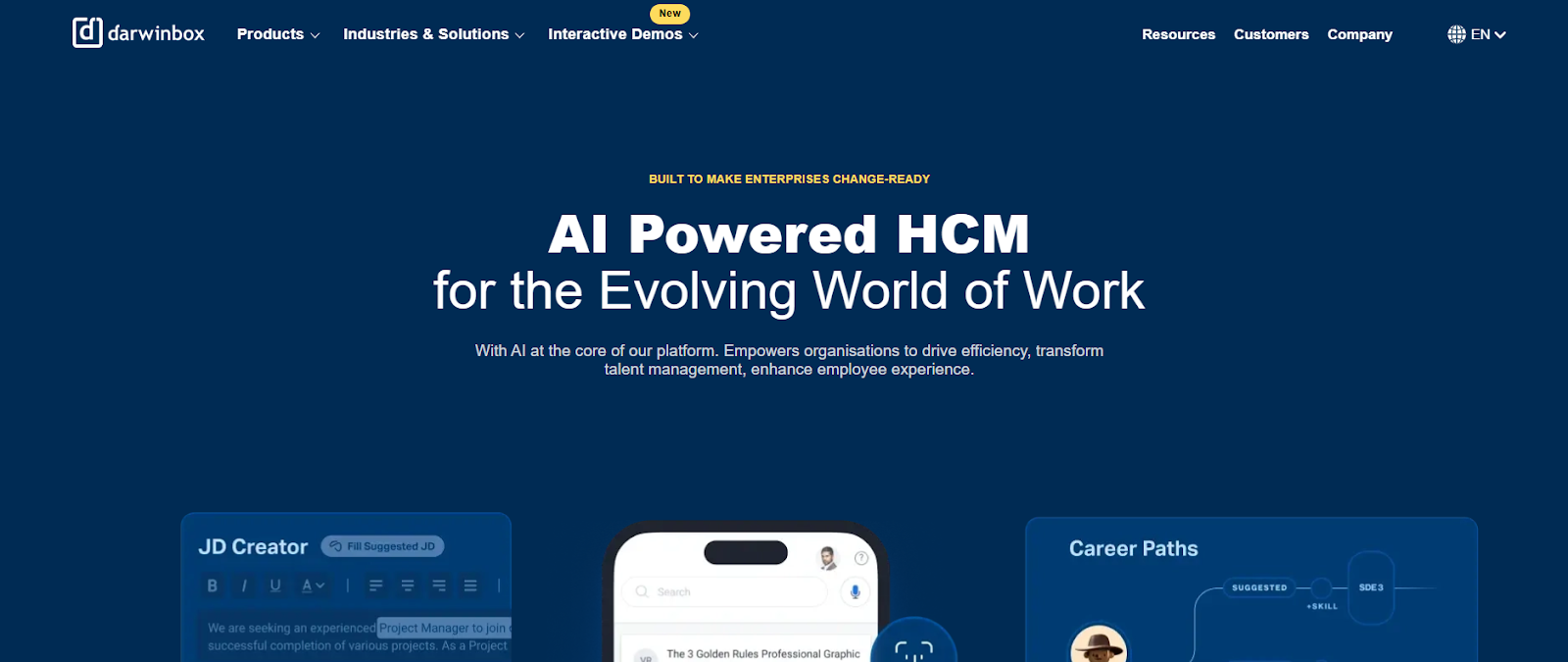
Best for: Companies looking for an AI-powered HRMS with deep analytics.
Overview:
Darwinbox is an AI-driven HRMS with cutting-edge analytics and automation features.
Key Features & Strengths:
✔ AI-Based Talent Management – Automates recruitment and performance tracking.
✔ Cloud-Based Workforce Analytics – Provides real-time HR insights.
10. UKG Pro
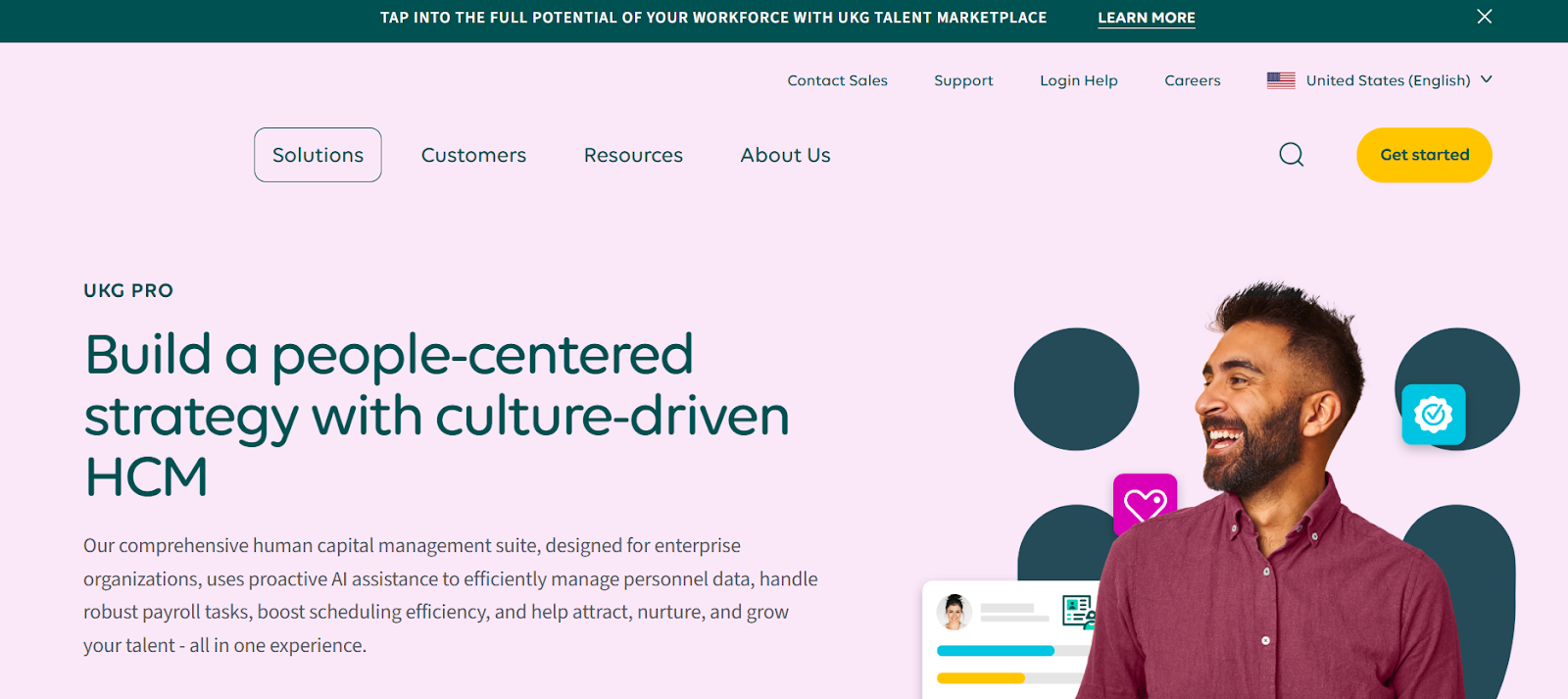
Best for: Large organizations needing a comprehensive HRMS for global teams.
Overview:
UKG Pro is a top-tier HRMS with global payroll, workforce management, and compliance solutions.
Key Features & Strengths:
✔ Comprehensive Global Payroll & Compliance – Supports multi-country payroll.
✔ Advanced HR Analytics – Helps businesses make data-driven HR decisions.
Now that you’ve gotten a solid grasp on the available vendors, here’s how you can pick the one that fits your business like a glove.
How to Choose the Right HRMS Solution for Your Business?
Selecting the best HRMS for your organization requires careful evaluation of several key factors. Below, we break down the critical aspects to consider when choosing an HRMS that fits your business needs.
1. Assess your business size and needs
The HRMS solution you choose should align with your company’s size and workforce requirements.
- Small businesses & startups: Look for cost-effective and user-friendly solutions like BambooHR or Gusto with core HR features.
- Medium-sized companies: Consider Zoho People or Paycor, which offer scalability and automation without enterprise-level complexity.
- Large enterprises: Solutions like Workday, UKG Pro, or ADP Workforce Now provide advanced features for global HR management.
2. Understand pricing models and budget constraints
HRMS pricing varies based on features, scalability, and deployment options.
- Subscription-based pricing: Ideal for startups and SMBs, offering monthly or yearly payment plans.
- Per-employee pricing: Suitable for growing businesses that want flexible cost adjustments.
- Enterprise licensing: One-time payments or custom pricing for large corporations requiring extensive HRMS functionalities.
Tip: Always compare pricing tiers and hidden costs like setup fees, API integrations, or premium support before making a decision.
3. Ensure seamless integration with existing tools
Your HRMS should integrate effortlessly with existing business tools like:
- Payroll & Accounting Software (QuickBooks, Xero, ADP)
- Collaboration Platforms (Slack, Microsoft Teams)
- Recruitment & Performance Tracking Tools (LinkedIn Talent Solutions, SAP SuccessFactors)
Why It Matters: Smooth integrations reduce manual data entry, eliminate redundancies, and ensure a more connected HR ecosystem.
4. Prioritize ease of use & employee adoption
A complicated HRMS can slow down operations rather than enhance them.
Look for:
- Intuitive dashboards and navigation
- Employee self-service portals for ease of access
- Customizable workflows that adapt to your company’s HR processes
5. Evaluate support and training services
Even the best HRMS needs proper onboarding, training, and support to maximize its effectiveness.
Key Questions to Ask:
- Does the vendor provide 24/7 customer support?
- Are training resources (videos, tutorials, webinars) available?
- What is the response time for resolving technical issues?
Why It Matters: A well-supported HRMS ensures a smoother transition, faster issue resolution, and increased employee satisfaction.
Consider utilizing TLD’s Marketplace platform to simplify your search process with expert reviews and comparisons that align with your company’s size and specific HR needs.
Conclusion
Choosing the right HRMS is essential for streamlining HR operations, improving compliance, and enhancing overall workforce efficiency. With features like automation, centralized data management, self-service portals, and real-time analytics, HRMS solutions help businesses save time, reduce costs, and drive better decision-making.
If you’re looking for a comprehensive HR technology marketplace to explore the best HR solutions for your business, TeamLease Digital is the perfect place to start. As Asia and the Middle East’s largest HR technology marketplace, hrtech connects HR professionals with the right tools and solutions to meet their specific needs.
Discover the best HRMS solutions for 2025 with TeamLease Digital today! Visit our website to explore a wide range of HR software, tools, and expert insights—all in one place.

